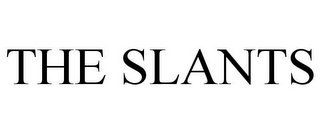 Simon Tam a member of the rock group “The Slants.” Tam applied to register the mark The Slants. But the USPTO refused registration under section 2(a) of the Lanham Act asserting that the mark was disparaging. In June of 2017, the Supreme Court found the section 2(a) prohibition on disparaging marks violated the First Amendment in Matal v. Tam, No. 15-1293 (2017). It is an important ruling in the Federal Circuit’s decision striking down the bar on registration of immoral and scandalous marks, so I’m going back to review it now.
Simon Tam a member of the rock group “The Slants.” Tam applied to register the mark The Slants. But the USPTO refused registration under section 2(a) of the Lanham Act asserting that the mark was disparaging. In June of 2017, the Supreme Court found the section 2(a) prohibition on disparaging marks violated the First Amendment in Matal v. Tam, No. 15-1293 (2017). It is an important ruling in the Federal Circuit’s decision striking down the bar on registration of immoral and scandalous marks, so I’m going back to review it now.
Tam’s Aim to Reclaim Ethnic Slur
Tam chose the name “The Slants” to reclaim and take ownership of stereotypes about people of Asian ethnicity. The band draws inspiration for its lyrics from childhood slurs and mocking nursery rhymes. It has album names such as “the Yellow Album” and “Slated Eyes, Slanted Hearts.”
Disparagement Bar
A portion of section 2(a) the Lanham Act prohibits the registration of a trademark “which may disparage … persons, living or dead, institutions, beliefs, or national symbols, or bring them into contempt, or disrepute.” The USPTO used a two part test to decide whether a trademark is disparaging. First it considers the likely meaning of the mark or the portion of the mark at issue. If that meaning is found to refer to identifiable persons, institutions, beliefs or national symbols, in the second step the USPTO asks whether that meaning may be disparaging to a substantial composite of the referenced group.
The justices were divided over the proper analysis of the constitutional issue but agreed on the result. Justice Alito provided an opinion for four justices and Justice Kennedy provided an opinion for four other Justices. Both Justices Alito and Kennedy agreed that the bar on disparaging marks constituted viewpoint based discrimination. If the message is a disparaging one, it is prohibited under section 2(a). That is the government is discriminating on the basis of the message, e.g. the view point.
Trademarks Are Not Government Speech
The justices agreed that registration of a mark does not transform the mark into government speech. On this point the court said that “If the federal registration of a trademark makes the mark government speech, the Federal Government is babbling prodigiously and incoherently.” It went on to cite examples of registration of marks that provide contradictory views. Simply registering marks and placing them in a database does not constitute government speech.
Kennedy: View-Point Discrimination Subject to Heightened Scrutiny
Justice Kennedy would have ended the inquiry there. His view is that once you have view-point discrimination and you conclude that the speech at issue is not government speech, you run into heightened scrutiny that the section 2(a) disparagement bar can’t survive. He said “It is telling that the Court’s precedents have recognized just one narrow situation in which viewpoint discrimination is permissible: where the government itself is speaking or recruiting others to communicate a message on its behalf.”
Alito:Â Disparagement Bar Cannot Survive Intermediate ScrutinyÂ
Justice Alito asserts that the court need not decide whether trademark registration comprises commercial speech, subject to relaxed intermediate scrutiny, or expressive speech subject to strict scrutiny because the disparagement bar cannot survive even intermediate scrutiny.
Under intermediate scrutiny “the regulatory technique may extend only as far as the interest it serves.” Alito found it fails this requirement. The government asserted the following interest that are purported to be served by the disparagement bar: (1) preventing underrepresented groups from being bombarded with demeaning messages in commercial advertising, and (2) protecting the orderly flow of commerce.
Alito dismissed the first interest because the First Amendment protects the freedom to express “the thought[s] that we hate.” And on the second interest, Alito finds that the disparagement bar is not narrowly drawn to drive out trademarks that support invidious discrimination. It reaches the disparagement of any person, group, or institution and applies to trademarks like “Down with racists.” He says its not an “anti-discrimination clause; it is a happy-talk clause.” Therefore it goes further than necessary to serve the interest asserted.
Impact of Decision
As I cited yesterday regarding the invalidation of the bar on immoral and scandalous marks, “The marketplace would ideally deal with the most offensive marks, as consumers would presumably refuse to purchase goods sold under marks that offend them.” Trademarks Laid Bare: Marks That May Be Scandalous or Immoral, 101 Trademark Rep. 1476 (2011). The same is likely true with disparaging marks, apart from instances like THE SLANT were the owner is trying to reclaim and change the meaning of a mark.
Probably the most high profile impact is that the Washington Redskins mark will remain registered. That mark was previously invalidated by the USPTO on the basis of the disparagement bar and that decision is the subject of a pending appeal to the Fourth Circuit. In June, the parties in the Redskins appeal filed letters to the Fourth Circuit stating that the Tam decision controls and that the USPTO decision canceling the Redskins mark should be reversed.
So it will take longer before the Redskins change their name, which is likely to happen eventually on account of public pressure, rather then legal rulings. Still it is doubtful that any serious sporting team would adopt the Redskins name today, if today was day-one of the franchise.
The law no longer bars registration of disparaging trademarks. But, we are unlikely to see a flood of businesses adopting disparaging marks in the marketplace.
One Reply to “Bar on Registrating Disparaging Trademarks Violates the First Amendment”
Comments are closed.